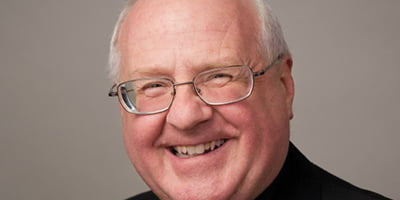
Father Mark Goldasich is the pastor of Sacred Heart parish in Tonganoxie. he has been editor of the Leaven since 1989.
Father Mark Goldasich
You’d better stop or you’re gonna stop, like it or not.
Has this ever happened to you? You’re in your car and see that you’re running a bit low on gas. You know that you need to stop and get some soon, but because you’re already behind, you don’t want to get “behinder.” So you let it go, knowing that you can get a couple more trips done before filling up. Well, after ignoring the gas gauge for about four or five trips, that little “low fuel” light pops on.
You tell yourself you should stop for gas immediately, but since you’ve got another two gallons in the tank and get, conservatively, 20 miles to the gallon, you’re OK. But then you hit some road construction that reduces traffic to one lane and you’re crawling along at five miles per hour and the air conditioner is on and now you’re kicking yourself for not stopping to fill that tank. You start to worry: What if I run out of gas? Where do I pull over since there’s no shoulder? Will one of the drivers behind me explode in road rage?
OK, you get the idea, right? One small neglected task — not taking those few minutes to stop for gas — has led to unnecessary stress and a potentially dangerous situation. Why do we let ourselves get into jams like this?
David Allen, the author of “Getting Things Done,” calls these items “open loops.” He describes them as “anything pulling at your attention that doesn’t belong where it is, the way it is.”
“Consider how many things you feel even the smallest amount of responsibility to change, finish, handle, or do something about,” he writes. “You have accepted some level of internal responsibility for everything in your life and work that represents an open loop of any sort.”
Sadly, I’ve got literally hundreds of these open loops nagging me. Although writing tasks down helps me to remember, the lists themselves then become open loops. Right now, I’ve got three small spiral notebooks in my pants pocket with any number of items written on them and seven special, super-duper note cards — each with sections for Things-To-Do, Reminders and Thoughts/Ideas — jammed into my shirt pocket, fighting for space with my iPhone with its additional “list apps.”
Is it any wonder, then, that I’m so (open) loopy?
There are, happily, two ways to escape this stress prison. One is obviously to take some action; the second is not so obvious: prayer.
I’ve already begun work this summer on my lists. The funny thing is
that many have only one or two “open loops” remaining on them. Rather than complete that last item, however, for some reason I leave it undone.
But not for long. I’ve been tackling those hanging items with the help of Regina Leeds and her “The 8 Minute Organizer” (Lifelong Books, 2012; 218 pgs.; $13.99). It starts with a quote from St. Gregory the Great: “Those who would climb to a lofty height must go by steps, not leaps.”
Although it seems silly to set a kitchen timer for eight minutes and then work on some “open loop,” you actually get quite a bit done in that focused amount of time. Leeds observes that we often squander these short pockets of time. She’s right. How many times have I checked out what’s happening on Facebook or played another round of Angry Birds for “a few” minutes when I could have checked off something important from my lists?
If you’re still doubtful about the power of eight minutes, ponder these suggestions:
• Never let dirty dishes pile up in the sink. Handle them only once: Wash them immediately or rinse them off and pop them in the dishwasher.
• The minute you take off an item of clothing, make a decision about its fate. Does it get rehung in the closet, thrown in the hamper, or tossed in the bag that goes to the cleaner? Stop leaving clothes on chairs, the bed, or the floor.
• Complete every action you start. For example, if you open a cupboard or drawer, close it when you’ve retrieved the item you need.
Leeds writes that “actions that keep you organized don’t require more time or effort than those that enslave you to chaos.” In other words, I’m intentional now about putting my keys and wallet in the same place when I come into the house instead of just laying them down . . . somewhere.
A good number of my eight minutes involve more than just organizing. I’ve written sympathy cards and thank-you notes; moved paperwork along from my desk to the proper person; sent a little gift and note to recent graduates; and contacted out-of-state friends who often get forgotten.
As for the prayer part, I’ve been calling on a favorite saint (and patron) of my Grandma Modrcin: St. Therese the Little Flower. Most people are well aware of her “Little Way,” which simply means doing the most ordinary of things — like cleaning, closing “open loops” or helping others — with love, in imitation of Jesus. This doesn’t nec- essarily make them any easier, but it does make them more meaningful and a step toward growing in holiness.
And, after all, that’s the “open loop” that should be at the top of our list.

